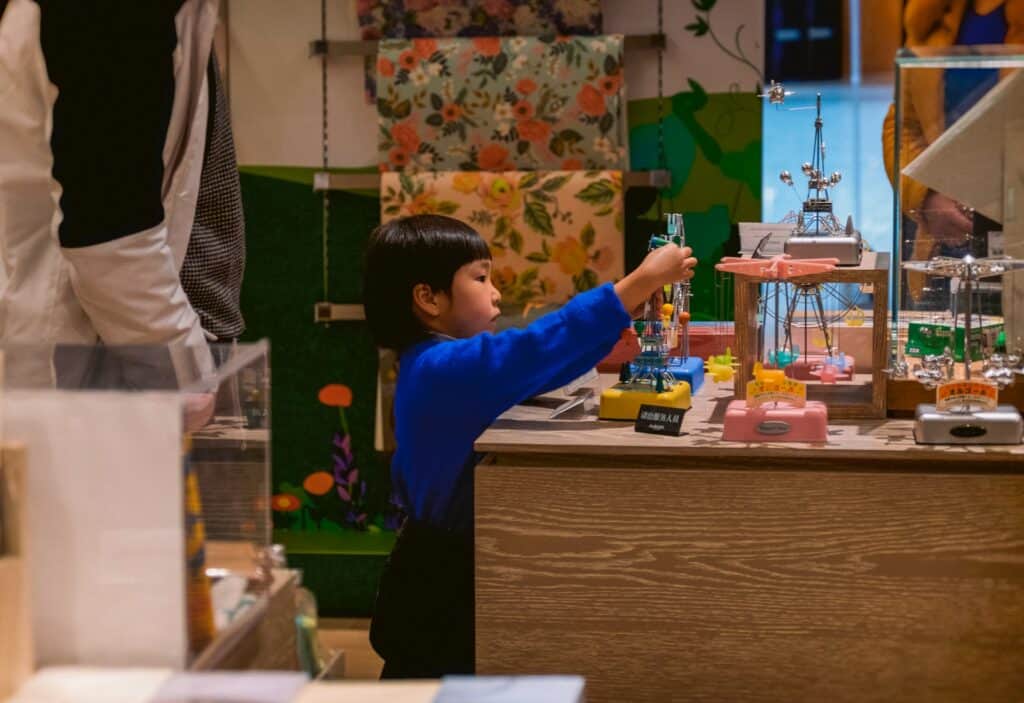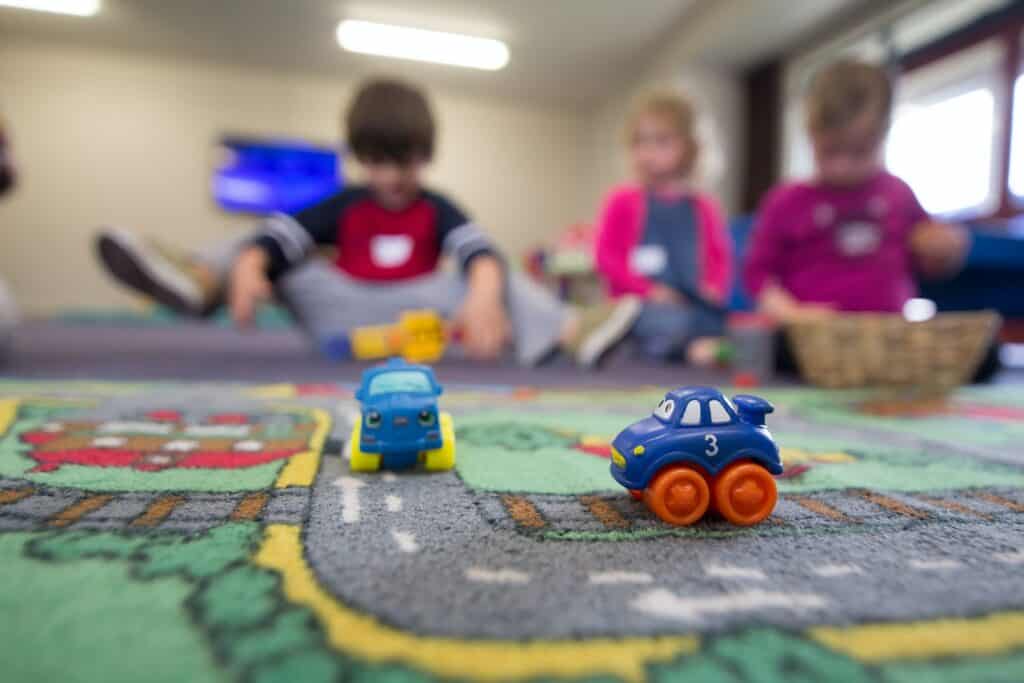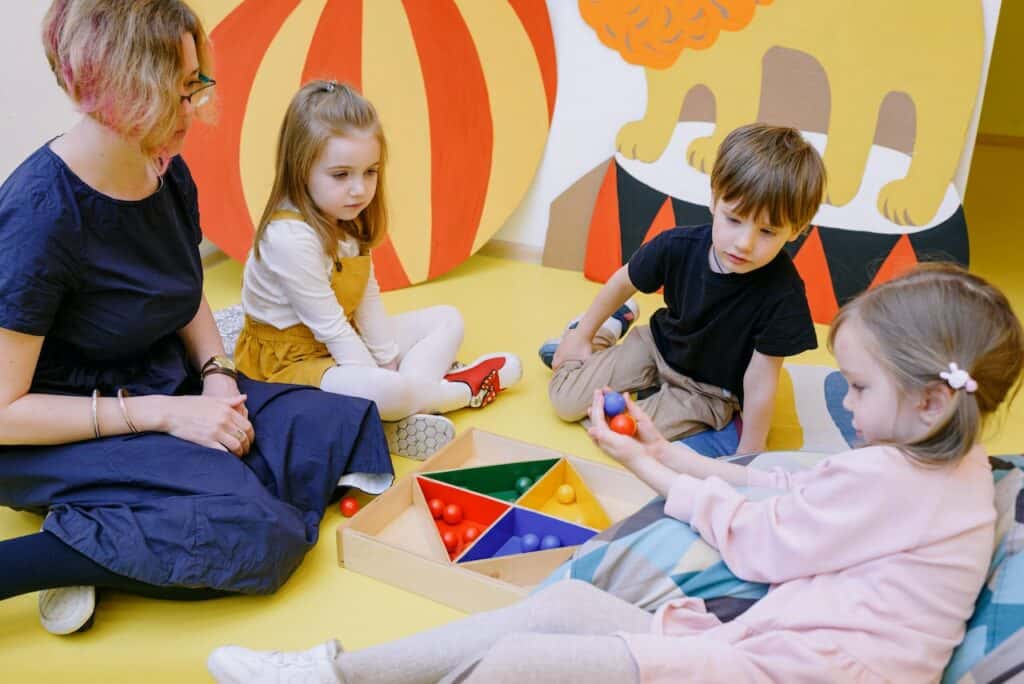Sending baby to daycare at 3 months can be a difficult decision for parents. It’s natural to worry about leaving your child in someone else’s care, especially at such a young age. However, for many families, daycare is a necessity, either because both parents work or because they need the extra support. In this article, we will explore the concept of daycare for infants, the right age for daycare, and how to prepare your baby for their first day.
Understanding the concept of daycare is essential before deciding whether it’s the right choice for your family. Daycare is a facility that provides care and supervision for children during the day when their parents are at work or unavailable. Daycare centers offer a range of services, from basic care to educational programs, and can be licensed or unlicensed. It’s important to research and choose a daycare center that meets your family’s needs and values.
Key Takeaways
- Daycare can be a difficult decision for parents of infants, but it’s a necessity for many families.
- Understanding the concept of daycare and choosing the right center is crucial.
- Preparing your baby for daycare and choosing the right age are important steps to ensure a positive experience.
Understanding the Concept of Daycare
Sending a baby to daycare at 3 months is a big decision for parents. It is important to understand the concept of daycare and what it entails before making this decision.

What is Daycare?
Daycare is a facility that provides care for children while their parents are at work or engaged in other activities. Daycare centers are typically licensed and regulated by the state and are required to meet certain standards for safety, health, and quality of care.
Who are the Caregivers?
Caregivers are the staff members who work at the daycare center and provide care for the children. They are responsible for feeding, changing, and providing activities for the children in their care. Caregivers are typically trained in child development and are required to pass background checks before being hired.
What is the Role of the Provider?
The provider is the owner or operator of the daycare center. They are responsible for ensuring that the center meets state regulations and provides a safe and nurturing environment for the children in their care. Providers may also be responsible for hiring and training staff, managing finances, and communicating with parents.
What to Expect from Daycare Staff?
Parents can expect daycare staff to be knowledgeable and experienced in caring for young children. They should be able to provide a safe and nurturing environment for the children in their care. Staff should also be able to communicate effectively with parents and provide updates on their child’s progress.
In conclusion, understanding the concept of daycare is essential for parents who are considering sending their baby to daycare at 3 months. Daycare centers provide a safe and nurturing environment for children while their parents are at work or engaged in other activities. The staff at daycare centers are trained and experienced in caring for young children and should be able to provide quality care and communicate effectively with parents.
The Right Age for Daycare
Deciding when to send a baby to daycare can be a difficult decision for parents. Many factors can influence this decision, including family circumstances, financial considerations, and the child’s developmental needs.

For newborns and young infants, most experts recommend waiting until the child is at least three months old before starting daycare. At this age, babies have developed some of the skills necessary to begin interacting with others and can benefit from the stimulation and socialization that daycare can provide.
However, it is important to note that every child is different, and parents should consider their child’s individual needs and temperament when making this decision. Some babies may be ready for daycare earlier, while others may need more time at home with a parent or caregiver.
Parents should also consider the quality of the daycare provider and the program. Look for a provider who is experienced in caring for infants and who has a nurturing and responsive approach. The program should also provide a safe and stimulating environment that supports the child’s development.
Overall, the decision to send a baby to daycare at three months is a personal one that should be based on the child’s needs, the family’s circumstances, and the quality of the daycare provider and program.
Preparing Your Baby for Daycare
Sending a baby to daycare at 3 months old can be a challenging decision for parents. However, with proper preparation, the transition can be made smoother for both the baby and the parents.

Establishing a Routine
Before sending the baby to daycare, it is essential to establish a consistent routine at home. This routine should include regular feeding times, nap times, and playtime. By establishing a routine, the baby will feel more secure and comfortable in the daycare environment.
First Day of Daycare
On the first day of daycare, it is important to arrive early and spend some time with the baby in the new environment. This will help the baby feel more comfortable and familiarize them with the surroundings. It is also recommended to bring along a familiar object, such as a blanket or toy, to provide comfort and a sense of security.
Comfort and Emotions
It is common for babies to experience separation anxiety when first starting daycare. To ease this anxiety, parents can provide comfort by talking to the baby, soothing them with a familiar object, and ensuring that the caregiver is aware of the baby’s emotional needs.
Attachment and Transitional Objects
Transitional objects, such as a special blanket or stuffed animal, can help the baby feel more secure and attached to the caregiver. Parents should discuss this with the daycare provider to ensure that the object is allowed and that it is kept in a safe place.
Overall, preparing a baby for daycare involves establishing a routine, providing comfort and emotional support, and ensuring that the baby feels secure and attached to the caregiver. With proper preparation, the transition to daycare can be a positive experience for both the baby and the parents.
Choosing the Right Daycare
When it comes to choosing the right daycare for your baby, there are several factors to consider. Parents want to ensure that their child is in a safe and nurturing environment while they are away. Here are some things to keep in mind when selecting a daycare:

1. Reviews
One of the best ways to get an idea of a daycare’s quality is to read reviews from other parents. Look for reviews on the daycare’s website, social media pages, and other online platforms. Pay attention to what other parents say about the staff, facilities, and overall experience.
2. Safety
Safety is a top priority when it comes to choosing a daycare. Make sure the daycare has security measures in place, such as cameras and secure entrances. Additionally, ask about the daycare’s policies on illness and emergency situations.
3. Cleanliness
Cleanliness is important for both the health and comfort of your baby. Look for a daycare that maintains a clean and hygienic environment. Check for clean toys, changing tables, and other equipment.
4. Ratio
The ratio of caregivers to children is an important factor in determining the quality of care your baby will receive. Make sure the daycare has enough staff to provide individual attention to each child.
5. Nearby
Choosing a daycare that is close to home or work can make drop-off and pick-up easier and less stressful. Consider the location of the daycare when making your decision.
By taking these factors into consideration, parents can feel confident in their choice of daycare for their 3-month-old baby.
Daycare Experience for Infants
Sending a baby to daycare at just three months old can be a difficult decision for parents. However, with the right daycare facility and staff, infants can have a positive experience that promotes their growth and development.
At a reputable daycare center, infants are provided with a safe and stimulating environment that encourages play and interaction with caregivers and other babies. Caregivers are trained to support infants’ physical, emotional, and cognitive development through age-appropriate activities and experiences.
Infants at daycare may engage in activities such as tummy time, reading books, listening to music, and exploring toys that promote sensory development. Caregivers may also use sign language to communicate with infants before they are able to speak, which can help promote language development.
In addition to play and activities, infants at daycare are also provided with opportunities to develop important skills such as socialization, communication, and self-regulation. Caregivers work with parents to establish consistent routines for feeding, sleeping, and diaper changing, which can help infants feel secure and develop a sense of predictability.
Overall, the daycare experience for infants can be a positive one that supports their growth and development in a safe and nurturing environment. With the right daycare center and staff, parents can feel confident in their decision to send their baby to daycare at three months old.
Feeding Your Baby at Daycare
Feeding your baby at daycare can be a daunting task for new parents, but with the right preparation and communication, it can be a smooth transition for both you and your baby.

Most daycares will provide a feeding schedule for parents to fill out, indicating when and how much their baby should be fed. It is important to communicate any special feeding needs or preferences with the daycare provider, such as if your baby is breastfed or formula-fed.
For breastfed babies, it is important to bring enough breast milk to last throughout the day. This can be stored in bottles or bags and labeled with the baby’s name and date. Some daycares may also provide a space for mothers to breastfeed during drop-off or pick-up times.
For formula-fed babies, parents should provide enough pre-measured formula for the day, along with bottles and nipples. It is important to communicate any special instructions for preparing the formula, such as the temperature or mixing ratio.
Parents should also provide bibs and any other feeding accessories their baby may need, such as burp cloths or spoons. It is important to label all items with the baby’s name to avoid mix-ups.
Overall, communication and preparation are key when it comes to feeding your baby at daycare. By working with your daycare provider and providing all necessary items, you can ensure that your baby is well-fed and comfortable throughout the day.
Dealing with Separation Anxiety
Leaving a 3-month-old baby in daycare can be a daunting experience for both the baby and the parents. Separation anxiety is a common issue that arises when a baby is left with strangers for extended periods. It occurs when a baby becomes distressed when separated from their primary caregiver.
To help ease separation anxiety, parents can try the following techniques:
- Gradual Separation: Start by leaving the baby with the caregiver for short periods, gradually increasing the time away. This will help the baby adjust to being away from their primary caregiver.
- Consistency: Keep the routine consistent when dropping off and picking up the baby. This will help the baby feel secure and know what to expect.
- Comfort Item: Provide the baby with a comfort item, such as a blanket or stuffed animal, that smells like the primary caregiver. This can help soothe the baby and make them feel more comfortable.
- Positive Goodbyes: Say goodbye to the baby in a positive and reassuring manner. This will help the baby feel confident and secure.
It is important to note that separation anxiety is a normal part of a baby’s development. With time and patience, most babies will adjust to being in daycare and will develop a sense of security and confidence. Parents should also take time for themselves to recharge and have some “me time” to help reduce their stress levels.
Essential Supplies for Daycare
Sending a baby to daycare at 3 months can be a daunting task for parents. To ensure a smooth transition, it is important to have all the necessary supplies ready. Here are some essential supplies that parents should consider when sending their baby to daycare.

Diapers and Diaper Supplies
One of the most important supplies for daycare is diapers. Parents should ensure that they provide enough diapers for the whole day, as well as extra ones just in case. It is also important to provide diaper cream, wipes, and disposable bags for soiled diapers.
Clean Clothes
Babies can be messy, and accidents can happen at any time. Parents should pack extra clothes for their baby, including socks, bibs, and hats. It is important to label all clothing items with the baby’s name to avoid mix-ups.
Nap Supplies
Babies need a lot of sleep, and it is important to provide a comfortable and safe place for them to nap. Parents should provide a crib sheet, a blanket, and a pacifier if the baby uses one.
Feeding Supplies
If the baby is formula-fed, parents should provide enough formula for the whole day, as well as bottles and nipples. If the baby is breastfed, parents should provide breastmilk storage bags and a breast pump if necessary.
Checklist
To ensure that all necessary supplies are packed and ready, parents should create a checklist. The checklist should include all the essential supplies, as well as any specific instructions from the daycare provider.
In conclusion, sending a baby to daycare at 3 months can be a challenge, but having the right supplies can make it easier. By packing all the necessary supplies, parents can ensure that their baby is comfortable and well taken care of while at daycare.
Returning to Work Post Maternity
Returning to work after maternity leave can be a daunting experience for new parents, especially if they have to leave their 3-month-old baby in daycare. However, it is a reality that many working parents face, and with the right preparation, it can be a smooth transition for both the parent and the baby.
One of the first steps to take is to ensure that the baby is enrolled in a reputable daycare center that meets all the necessary safety and health standards. This will give the parent peace of mind knowing that their baby is in good hands while they are at work. It is also important to visit the daycare center beforehand to familiarize oneself with the staff and the facilities.
Another important consideration is the logistics of returning to work. Parents may need to make arrangements for transportation, such as finding a reliable carpool or arranging for a nanny to drop off and pick up the baby from daycare. It is also important to plan for any unexpected situations, such as sick days or emergencies.
For some parents, returning to work may also mean negotiating flexible work arrangements with their employer, such as working from home or adjusting their work hours. This can help ease the transition and allow for more quality time with the baby.
Lastly, it is important for parents to take care of themselves during this transition period. Returning to work can be emotionally and physically draining, and it is important to prioritize self-care and seek support from family and friends.
In summary, returning to work post maternity can be a challenging but manageable experience for new parents. By enrolling the baby in a reputable daycare center, planning for logistics, negotiating flexible work arrangements, and prioritizing self-care, parents can ensure a smooth transition back to the workforce.
Health and Hygiene at Daycare
When it comes to sending a 3-month-old baby to daycare, parents are understandably concerned about the health and hygiene of the facility. A clean and hygienic environment is essential for the well-being of young children, especially those with developing immune systems.

Most daycare centers have strict policies in place to maintain a hygienic environment. This includes regular cleaning and disinfecting of toys, surfaces, and equipment. Staff members are trained to follow proper hand-washing techniques and to encourage children to do the same.
Additionally, many daycare centers have policies in place to prevent the spread of illness. Children who are sick are typically not allowed to attend daycare until they are well again, and staff members are required to stay home if they are ill.
While it’s impossible to completely eliminate the risk of illness, sending a baby to a daycare with a strong focus on hygiene can help minimize the risk. It’s important for parents to ask about the facility’s policies and procedures for maintaining a clean and healthy environment.
Parents of children with allergies should also discuss their child’s needs with the daycare staff. This may include providing specific foods or avoiding certain allergens in the facility. By working together, parents and daycare staff can help ensure the health and safety of young children in their care.
Understanding the Cost of Daycare
Sending a baby to daycare at three months old can be a difficult decision for many parents. One of the biggest concerns is the cost of daycare. Understanding the cost of daycare can help parents make an informed decision about whether or not it is the right choice for their family.
The cost of daycare can vary depending on several factors, including location, type of daycare, and age of the child. In general, daycare costs can range from $200 to $2,000 per month. Some daycare centers may offer discounts for siblings or for full-time enrollment.
It’s important to note that the cost of daycare is not just the monthly fee. There may also be additional fees for things like registration, supplies, and field trips. Some daycare centers may also charge extra for early drop-off or late pick-up.
Parents may be eligible for financial assistance to help cover the cost of daycare. This assistance can come from government programs, such as the Child Care Subsidy, or from employers who offer a dependent care flexible spending account.
When considering the cost of daycare, it’s important to weigh the benefits against the cost. Daycare can provide a safe and stimulating environment for a child, as well as socialization with other children. It can also allow parents to work or pursue other activities.
In conclusion, understanding the cost of daycare is an important factor for parents when deciding whether or not to send their baby to daycare at three months old. While the cost can vary, there may be financial assistance available and the benefits of daycare should also be considered.
Related posts:
Frequently Asked Questions
What is the best age to put a baby in daycare?
There is no one-size-fits-all answer to this question. It ultimately depends on the needs of the family and the child. Some parents choose to start daycare as early as six weeks old, while others wait until their child is a year old. It’s important to consider factors such as the child’s temperament, the parents’ work schedules, and the availability of quality daycare options in the area.
How long does it take a 3 month old to adjust to daycare?
It can take a few weeks for a 3 month old to adjust to daycare. However, every child is different, and some may take longer to adjust than others. It’s important for parents to communicate with the daycare provider and work together to create a plan that will help their child feel comfortable and secure in the new environment.
How do I prepare my 3 month old for daycare?
Parents can prepare their 3 month old for daycare by gradually introducing them to new environments and people. They can also practice leaving their child with a trusted caregiver for short periods of time to help them get used to being away from mom and dad. It’s also important to establish a consistent routine and communicate with the daycare provider about the child’s needs and preferences.
What are the benefits of infant daycare?
Infant daycare can provide socialization opportunities for young children and help them develop important skills such as communication and problem-solving. It can also provide a safe and nurturing environment for children while their parents are at work.
Are there any risks associated with sending a 3 month old to daycare?
There are some risks associated with sending a 3 month old to daycare, such as exposure to illness and germs. However, many daycares have strict health and safety protocols in place to minimize these risks. It’s important for parents to do their research and choose a daycare that prioritizes the health and well-being of the children in their care.
What should I look for in a daycare for my 3 month old?
When choosing a daycare for a 3 month old, parents should look for a clean and safe environment, experienced and qualified staff, and a low child-to-caregiver ratio. It’s also important to consider the daycare’s policies on things like feeding, napping, and communication with parents.

Iesha is a loving mother of 2 beautiful children. She’s an active parent who enjoys indoor and outdoor adventures with her family. Her mission is to share practical and realistic parenting advice to help the parenting community becoming stronger.
